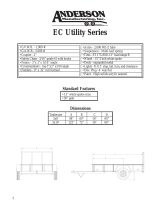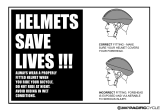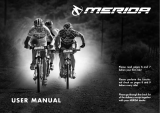
7
TO ENSURE SAFETY
CAUTION
Be sure to also inform users of the following:
•
Be sure to shift the shifting lever one gear at a time. During shifting, reduce the force being applied to the pedals. If you try to force operation of the
shifting lever or perform multi-shifting while the pedals are being turned strongly, your feet may come off the pedals and the bicycle may fall over,
which could result in serious injury.
Using the shifting lever to multi-shift to a light gear may also cause the outer casing to spring out of the shifting lever.
This does not affect the capabilities of the shifting lever because the outer casing returns to the original position after shifting.
Disc brake specifications
•
Disc brakes have a burn-in period, and braking force will gradually increase as the burn-in period progresses; therefore, make sure that you are aware
of any such increases in braking force when using the brakes during this period. The same thing will happen when the brake pads or disc brake rotor
are replaced.
Coaster brake specifications
•
Continuous application of the brakes when riding down long slopes will cause the internal brake parts to become very hot, weakening braking
performance, and may also cause a reduction in the amount of brake grease inside the brake, leading to problems such as abnormally sudden braking.
•
Spin the wheel and confirm that the braking force of the coaster brake is correct.
Roller brake specifications
•
If the brake is used frequently, the area around the brake may become hot. Do not touch the area around the
brake for at least 30 minutes after riding the bicycle.
Area around the brake
•
Continuous application of the brakes when riding down long slopes will cause the internal brake parts to become very hot, weakening braking
performance, as well as causing a reduction in the amount of brake grease inside the brake, which can lead to problems such as abnormally sudden
braking.
•
The brake unit and front hub unit should never be disassembled. If they are disassembled, they will no longer work properly.
NOTICE
Be sure to also inform users of the following:
•
The gears can be shifted while lightly pedaling, but on rare occasions the pawls and ratchet inside the hub may produce some noise afterwards as part
of normal gear shifting operation. In addition, a loud sound may be temporarily emitted if the gears are shifted while strongly pedaling with E-BIKE,
etc., but this is normal.
•
The internal geared hub is not completely waterproof. Avoid using the hub in places where water might get inside and do not use high-pressure
water to clean the hub, otherwise the internal mechanism may rust.
•
Do not disassemble the hub. If you need to disassemble it, contact the place of purchase.
•
All of the following occurrences are due to the internal gear-shifting structure and are not the failure of the internal components.
Phenomenon
Type of hub
Gear positions where
phenomenon might occur
For coaster brakes
For roller brakes/
V-BRAKE
Noise occurs when the pedals rotate. × - All gear positions except 1st
Noise occurs when the bicycle is pushed backward. × × All gear positions except 1st
The hub has a built-in mechanism that supports gear shi
fting
and when the mechanism operates during gear shi
fting,
noise and vibrations occur.
× × All gear positions
Depending on gear position, gear-shifting may feel different. × × All gear positions
Noise occurs when pedal rotation is stopped during riding. × - All gear positions
•
Products are not guaranteed against natural wear and deterioration from normal use and aging.























